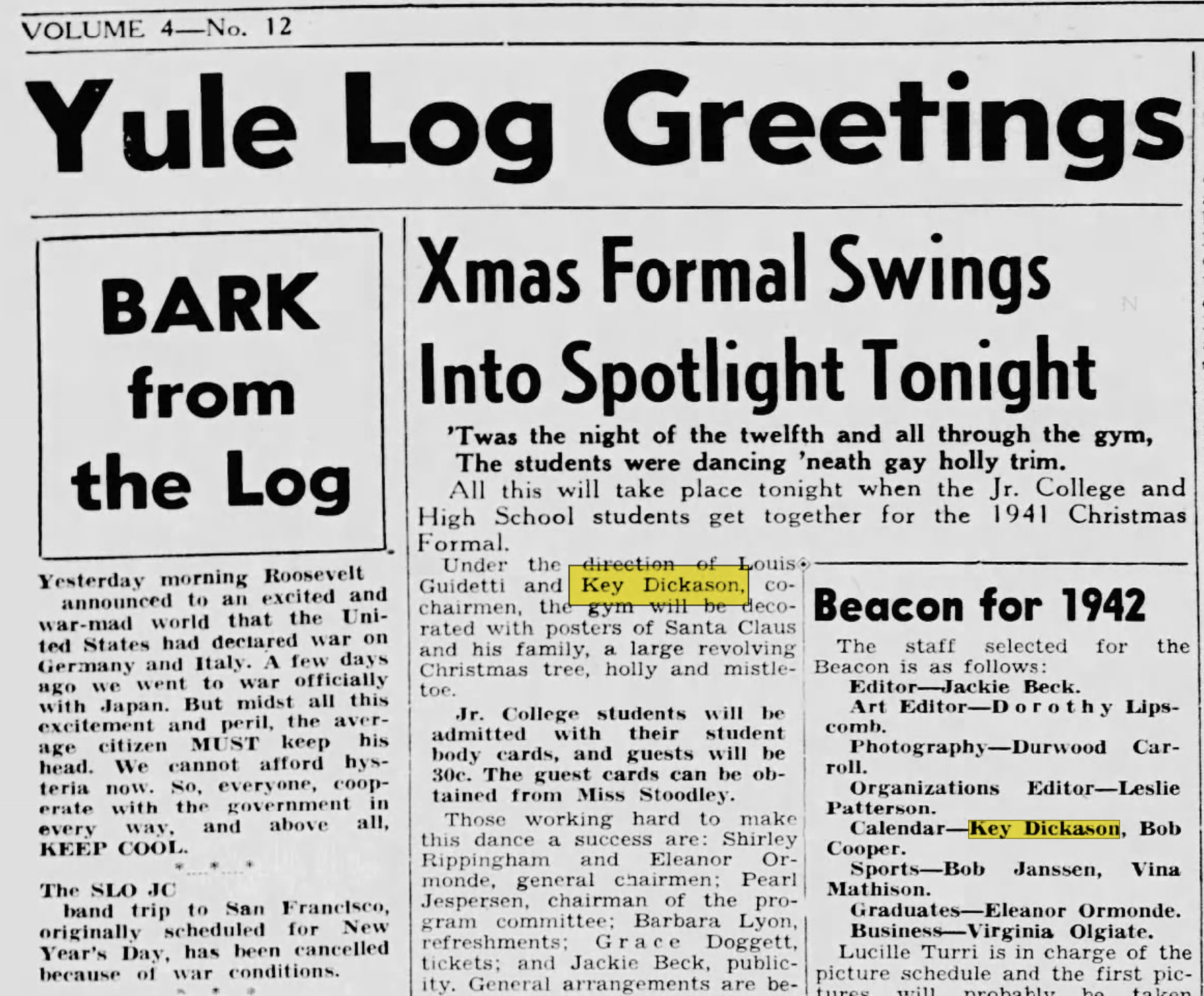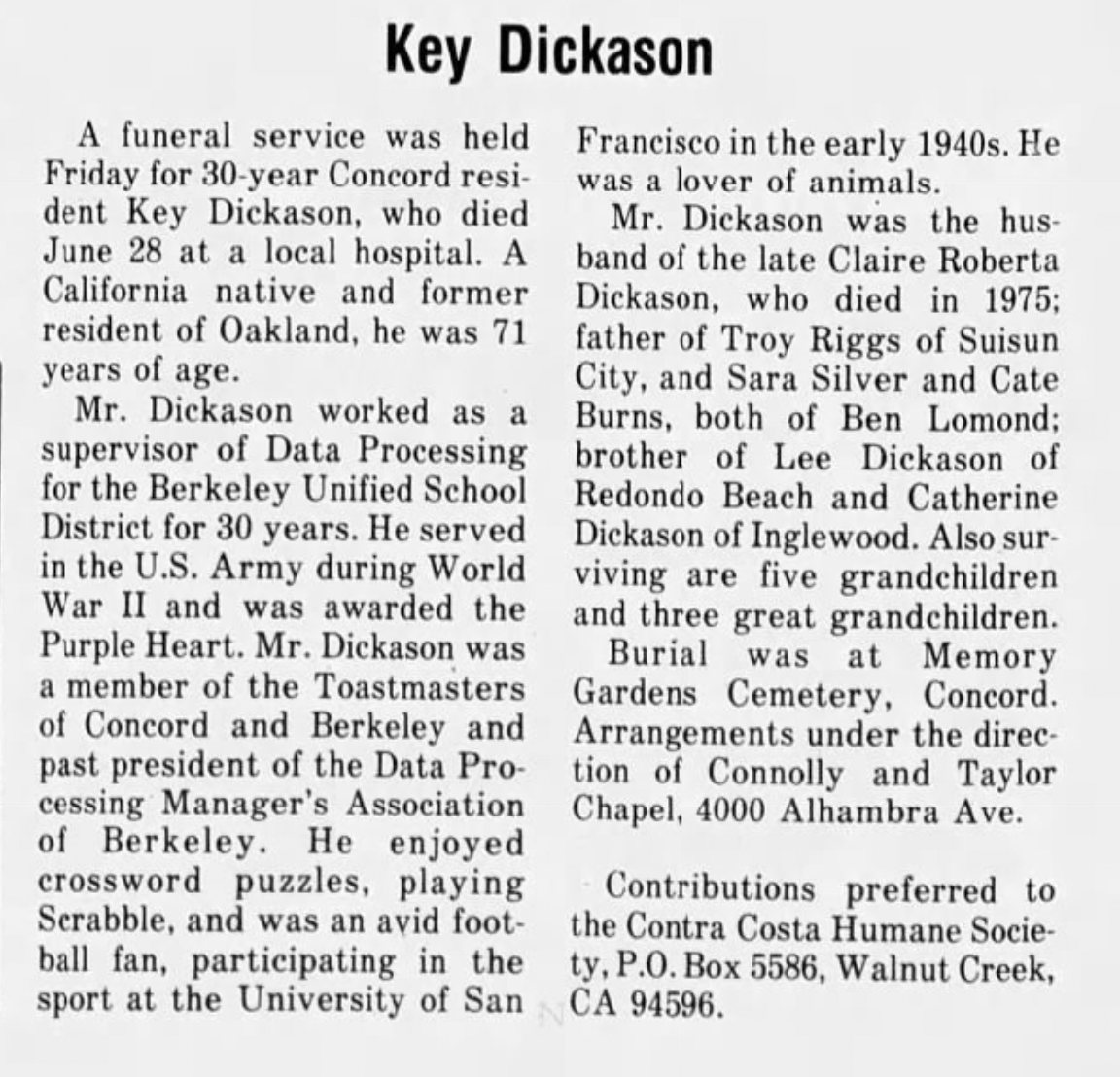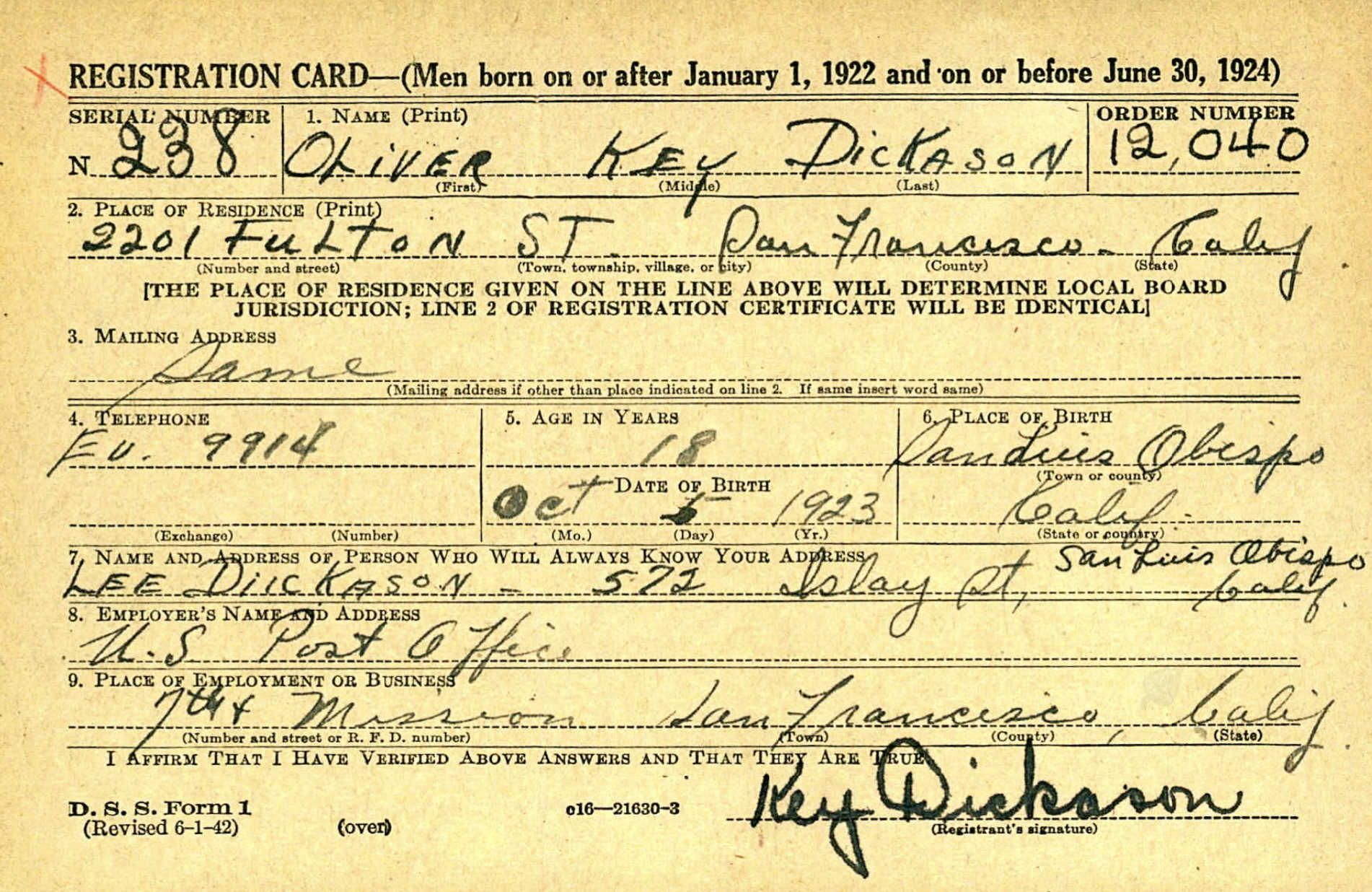Sergeant Dickason's Blend
« previous post | next post »
Over brunch the other day, a question came up that I've wondered about in the past: Who was the "Major Dickason" of Major Dickason's Blend?
Skipping my imaginary histories, here's the real story.
According to "A coffee revolution: Peet’s’ first ever employee spills the beans", Berkeleyside 7/25/2023:
Long before the pandemic, the widespread adoption of craft coffee and the recent national coffee shop union drive, Bill Coffin was Employee Number One at the original Peet’s Coffee shop at Vine and Walnut streets in Berkeley.
When Peet’s opened on April 1, 1966, the polio epidemic was the only national health event people talked about, the entire country was drinking Folger’s Instant and there were no baristas, and hence no call for a workers’ union.
But the country was on the verge of a coffee revolution, and Coffin was right there at its inception. […]
“Alfred was a coffee evangelist,” said Coffin, who lived three blocks from the first Peet’s, which is still operating at 2124 Vine St., and started working there when he was just 15, just a few months after the store opened.
“He spent hours talking with customers, educating them about different blends. He served a free cup of coffee with every pound of coffee, and he deliberately made the coffee strong to get more flavor.”
But changing peoples’ minds – and palates – didn’t happen overnight, said Coffin, who still lives in Berkeley. […]
In the beginning, the store was not busy, even on Saturdays. “People were used to American coffee,” he said. “One woman barely got through a cup of freshly brewed coffee and said to her husband, ‘I can do better in my percolator at home,’” Coffin said. “Alfred and I just looked at each other and laughed – after they left, of course.”
You can learn more about Alfred Peet's life history from his Wikipedia page. But what about that blend?
In the early days, Peet sold almost no coffee in the bean. Customers would make their choices and Peet would grind the coffee in the store. The current practice of people using a coffee shop as a place to work or hold meetings had not yet emerged; there was one counter with five or six stools.
Peetniks and foodies alike will appreciate that Coffin witnessed an historic moment: the naming of Major Dickason’s Blend.
According to Coffin, Peet worked with a frequent customer, a retired military gentleman, to develop the blend, tasting many combinations before settling on what was to become Peet’s all-time bestseller.
“Key Dickason and Alfred developed the blend together,” Coffin said. “Alfred told him, ‘I am going to name it after you – Major Dickason’s Blend.’”
Dickason said, ‘But I was a sergeant.’
Peet responded, ‘You’ve been promoted.’”
I'm sorry to say that Key Dickason has no Wikipedia page. Someone with that name appears often in a San Luis Obispo school newspaper in 1941 and 1942, e.g. this from 12/12/1941:
I don't know whether this is the same person, though it might be.
But since this is Language Log and not Historical Foodie Log, what's the linguistic angle? There are always linguistic angles, and in this case I'll mention two.
First, there's the suffix -nik in "Peetnik". As Wiktionary explains, the etymology is
From the Slavic suffix represented by Russian -ник (-nik). This suffix experienced a surge in English coinages for nicknames and diminutives after the 1957 Soviet launch of the first Sputnik satellite. English usage is heavily influenced by Yiddish usage of ־ניק (-nik) and similar borrowed words (nogoodnik, nudnik, kibbutznik).
For further information, Wiktionary cites Kabakchi and Doyle, "Of Sputniks, Beatniks, and Nogoodniks", American Speech 1990.
And in the second place, there's sergeant. Wiktionary's etymology:
From Middle English sergeant, sergeaunt, serjent, serjaunt, serjawnt, sergant, from Old French sergeant, sergent, serjant, sergient, sergant (“sergeant, servant”), from Medieval Latin servientem, accusative of serviens (“a servant, vassal, soldier, apparitor”), from Latin serviēns (“serving”), present participle of serviō (“serve, be a slave to”). Doublet of servant and servient.
Having served in in the army under the authority of sergeants, I'd have been inclined to look for an etymology evoking a more dominant role. But of course the same path leads to the words serve, in the sense "To be in military service", and service, in the sense "The military".
And somewhere in all of this is the traditional distinction between "officer" and "enlisted" categories in the military. I've always been puzzled by the lack of American pushback against this durable residue of European class hierarchies — though web search turns up some.
Update — Andrew Garrett sends in this obit from the Martinez News-Gazette, March 1, 1995:
…and also Sergeant Dickason's draft card, which reveals that his full name was Oliver Key Dickason:



Coby said,
August 7, 2023 @ 8:03 am
I was among the early customers of Peet's; I also lived only a few blocks away.
As a matter of fact, Berkeley at the time already had several coffeehouses — mostly owned by Italians — "as … place[s] to work or hold meetings" (a habit that I had acquired during my postdoc year in Paris), most notably the Mediterraneum (previously known as Piccolo Caffè) on the Southside and the Caffè Espresso on the Northside.
Now, about language: On one of my visits I noticed Mr. Peet (who was Dutch) had relabeled his stock of Celebes coffee as Sulawesi. I asked him if Ceylon tea shouldn't be labeled as Sri Lanka. I meant is a a joke — Ceylon tea (my favorite) is Ceylon tea, and is so named even on tins coming from Sri Lanka, just as cats are Persian or Siamese, not Iranian or Thai.
But the next time I was there I saw that there was no more Ceylon coffee; it was now Sri Lanka, and continues to be so in the Peet's empire.
Cervantes said,
August 7, 2023 @ 8:13 am
I think the military retains the distinction between officers and enlisted [people] — which by the way as far as I know is ubiquitous in every nation — because it's useful for military operations. It's comparable to the difference between management and labor, and the main difference going in is normally a college degree. Enlisted personnel carry out specialized tasks, non-commissioned officers — sergeants — are people with experience doing those tasks as enlisted personnel who now directly supervise the people who do them, and officers make higher level decisions and command larger groups. They're largely distinct career paths. The Sergeant Major of the Army technically ranks lower than a lieutenant, although not really in practice. Maybe that doesn't make a whole lot of sense.
cameron said,
August 7, 2023 @ 8:57 am
the terminology of military ranks has always struck me as reflecting something like a neo-platonic hierarchy of being. it progresses from the "private" to the "general", by way of such metaphysically evocative terms as the "corporal", and the "lieutenant". A term like "sergeant" doesn't quite fit that theme very well. "major" fits the theme well enough, but isn't quite so evocative
J.W. Brewer said,
August 7, 2023 @ 10:01 am
There's an onomastics point, namely that "Dickason" is an extraordinarily rare variant spelling at least in the U.S. In the surname database from the 1990 census it is 47.679th most common, with an incidence that rounds to 0.000% of the population (presumably meaning <0.0005%?_). More common variants of what is presumably historically/etymologically the same surname or at least a cluster of very close relatives include:
Dickerson (#517, and a whopping 0.023% of the national population)
Dickinson (#1,177)
Dickenson (#5,828)
Dickison (#15,537)
Mark Liberman said,
August 7, 2023 @ 10:38 am
@Cervantes: It's comparable to the difference between management and labor.
Indeed. Along those lines, there was a standard joke (at least when I was in the U.S. Army, 1969-1972) — if a clueless recruit called a sergeant "sir", the response was "I ain't no damn sir, I work for a living…"
And if this was in Basic Training, the Drill Sergeant's response would probably continue "…now drop and give me 20". (Understood to mean 20 push-ups.)
Rodger C said,
August 7, 2023 @ 11:38 am
In early armies, AFAICT, there were two ranks: Soldier and Captain. Obviously a captain should be (socially) a chieftain, right? A lieutenant is a placeholder captain. A major is a really big captain. A colonel is … I just looked it up: the captain of a whole column. A general is everybody's captain. As for a sergeant, I think the point is that they assist the captain in getting the captain's wishes transformed into concrete commands.
J.W. Brewer said,
August 7, 2023 @ 11:41 am
For another example of the "servant" etymology seeming inconsistent with the hierarchical position of the role, consider the now-obsolete legal-profession title of https://en.wikipedia.org/wiki/Serjeant-at-law , given in former centuries in England and Ireland to a small and select group of lawyers who were supposed to be posher than ordinary barristers and had special rights and privileges.
Coby said,
August 7, 2023 @ 5:02 pm
I think that "general" was originally a postposed adjective, as in "attorney general", "surgeon general" as well as "lieutenant general", "major general", meaning essentially "in charge of the whole shebang". To Shakespeare, "general" as a noun meant "the general public" (Hamlet: "caviar for the general"). "General" as a noun denoting military rank came later. (It was already used by the church as the head of an order.)
David W said,
August 7, 2023 @ 7:01 pm
IIRC (from Am. Civil War history) "major general" is short for "sergeant major general," which explains why a major general (two stars) ranks below a lieutenant general (three).
Brett said,
August 7, 2023 @ 7:14 pm
The appearance of the term sergeant in military usage originated in the Middle Ages, when they were considered inferior to knights. The term was used in a lot of situations: for bodyguards, for skilled but (generally) unmounted troops (as opposed to levies), and for individuals with feudal duties other than knightly military service.
@Rodger C: A number of officer rank names originated with as compounds with captain. The designation of -major indicated a rank half a step up, while -lieutenant meant half a step down. So the rank above captain was captain-major (likewise sergeant-major). General arose as a shortening of captain-general (like secretary-general or guildmaster-general). Lieutenant-captain is also well attested, although it is probably not actually older than bare lieutenant as a rank term.
James Wimberley said,
August 8, 2023 @ 3:11 am
Himmler's SS adopted a complete new hierarchy of military ranks, erasing the historical traces of class distinctions along with outmoded notions of military honour and legality. "My honour is loyalty", it said on their belt buckles. Translate the ranks literally into English, and they sound as if written by a Boy Scout on meth: "Junior Squad leader", "Supergroup leader", etc. Full list here: https://en.wikipedia.org/wiki/Ranks_and_insignia_of_the_Waffen-SS
AG said,
August 8, 2023 @ 6:01 am
"Samurai" also means "servant".
Robert Coren said,
August 8, 2023 @ 11:10 am
@David W, re: Major General/Lieutenant General: Thanks. I'd always wondered about that.
Chris Button said,
August 8, 2023 @ 11:24 am
As someone who worked for a while in advertising and branding, I've always found Peet's Coffee to be quite an evocative name. It sounds personable (like a first name Pete, only different) while also conjuring up images of coffee grounds from a seed "pit" or kernel (just with a slightly altered longer "ee" instead of short "i" vowel, which could even be the same depending on your lingustic background).
Cervantes said,
August 8, 2023 @ 11:27 am
Naval ranks are different of course. The lowest officer rank is ensign, and lieutenant, the lowest officer rank in the army, is the next one up. (There's a "lieutenant junior grade" in between). A lieutenant commander can have charge of a vessel, normally a small or non-combat vessel, and a commander may be CO of a more important ship. Captain, a lower rank in the army, commands an major ship, and of course the equivalent of generals are admirals – rear, vice and full. Among the enlisted ranks, a petty officer is like a sergeant, but there's a slot in between for a warrant officer, who came up through the ranks but gets to wear an officer's uniform. How the navy and army evolved ranks differently I don't know.
Of course, with shore jobs, commanders and captains don't actually have ships.
Chris Button said,
August 8, 2023 @ 1:07 pm
Actually, I take that back. I think it is the subliminal connection with "peat" that is doing it for me.
So many layers. They do say the best brands are layered.
Robert Coren said,
August 9, 2023 @ 11:55 am
@Chris Button: My understanding of naval ranks (which I think derives in part from my reading a page about military ranks in out family's 2nd-edition Merriam-Webster Unabridged) is that the rank of Captain is equivalent to Colonel in the other services, but that the title of Captain is used for the commander of any ship, who in many if not most cases has a lower rank than Captain (Commander or Lieutenant Commander).
(Actually I think I picked up the last part of that from reading The Caine Mutiny, in which the central character, Lieutenant Commander Queeg, is addressed as "Captain" by his subordinate officers.)
Taylor, Philip said,
August 9, 2023 @ 1:58 pm
I don't think that I've every read The Caine Mutiny but I was immediately struck on reading Robert Coren's comment by the similarity between the name of Lieutenant-Commander Queeg and that of Queequeg, of Moby Dick fame. Co-incidence, or something more ?
Robert Coren said,
August 10, 2023 @ 11:17 am
@Philip Taylor: Other than the fact that they both work on ships, the two characters have absolutely nothing in common, so I suspect it's coincidence. Wouk might have had Queequeg's name in his head somewhere when he chose his captain's name, I suppose.
Chris Button said,
August 10, 2023 @ 4:07 pm
@ Robert Coren
Did you mean to address your earlier comment to me? I think you might be responding to someone else.
Robert Coren said,
August 11, 2023 @ 9:20 am
@Chris Button: Oh, yes, sorry, I got adjacent comments conflated. That comment was in response to @Cervantes.